Sommaire
Salon de l’agriculture: behind the politics, what’s the point of a trade show?
A threatened opening, an ultra-political show in the midst of a crisis in the run-up to the European elections: all the ingredients were there for a bit of fantasy at this agricultural show, with a relative drop in attendance (-2%, which is more like stability, especially given the context). It will leave a largely political taste, even though it is quite illustrative of the general issues surrounding shows and the contemporary world!

Key insights
- The trade show is a date set in advance that will bring together a group of stakeholders around a very specific theme. Nowadays, the players use this tool in a very conventional way, even when there is a crisis. (In the case of the Agricultural Show, everyone was ready for battle!) In a world that lives in real time, this dimension is key. It sets great milestones!
- Political activism now creates an information fog that needs to be mastered. Out of 1.3 million tweets, 90% are retweets. Out of 1,300 messages, only 130 are original, with metadata favouring outsiders. This creates a difficulty for political and related players in that the challenge is no longer to have a quantified indicator, but to understand the extent to which it is biased.
- The main problem created by this fog is that the agricultural message is being erased. What's the point of tweeting when you can meet Emmanuel Macron face-to-face and make a difference? Good question, the fact remains that faced with 1.3M tweets and a total absence of a farming community, the farming union will have its work cut out to avoid a gilets jaunes effect where politics interferes in the sector's complex struggles with the illusion of an easy resolution making it so that governments might find it easier to negotiate with the grassroots directly, in the absence of a union to manage it.
- There is a lack of mastery of formats across the board. No concerted mobilisation from an agricultural point of view, no digital presence, no narrative, no backstage, no power relationship. The farming sector can do better.
I(Nicolas V.) also think that we'll be talking again (both negatively and positively) about Emmanuel Macron's live-stream at the Salon de l'Agriculture, with hundreds of thousands of people watching a 2-hour stream. We'll be talking about this again, because if Emmanuel Macron hadn't accidentally burnt his cards beforehand, it could have been a well-organised and 'authentic' sequence in an exercise that he has mastered. We'll also be talking about this again, because despite the large number of viewers, the way in which he then made little use of these exchanges to establish his message and isolate the strongest moments shows that he doesn't leave a digital trail combining substance and form. And without both, the communication is insignificant and leaves no trace in the sequence.
What is the purpose of a sector show?
We're starting to get used to trade shows, with all the usual features of this type of event, namely that they are generally used :
- By primary stakeholders: to raise issues and to sell. Basically, the show is an extremely powerful marketing and awareness opportunity with a strong consumer component. It's a time to 'shine a light' on the sector for the year, by giving it something to shout about. "This year's show is marked by ..... It's an opportunity to bring the event to life with a whole range of first-circle stakeholders who constitute an interesting, loyal relay audience that we can rely on.
- By secondary stakeholders: there is a "gotcha" phenomenon, whether in the related sector or in politics. Basically, as soon as a stakeholder has an interest in the sector (sales, public affairs, partnerships, advertising, etc.), they will mark the show as one of the highlights of their conquest of the sector. These secondary parts are extremely interesting because they will make the event more visible through announcements, visits and so on. For the agriculture show, the political figure is extremely strong. For other trade fairs such as Vivatech, it's an opportunity to work on its image of innovation for "dinosaur" players. At the end of the day, however, a trade show is still an incredible opportunity to bring together an entire sector and all its components in a common place and over a short period of time.
- For the media: happening creates media attraction. Both by the fact that an event exists but also by the fact that it is associated with announcements and related presences with their announcement effects. It's an opportunity for the media to devote more 'serious' and in-depth coverage to a short-term news story that generally leaves little room for half measures.
This year, the stakeholder review produced a lukewarm response, showing that, despite the context, the format was fairly conventional, apart from Emmanuel Macron's appearance.
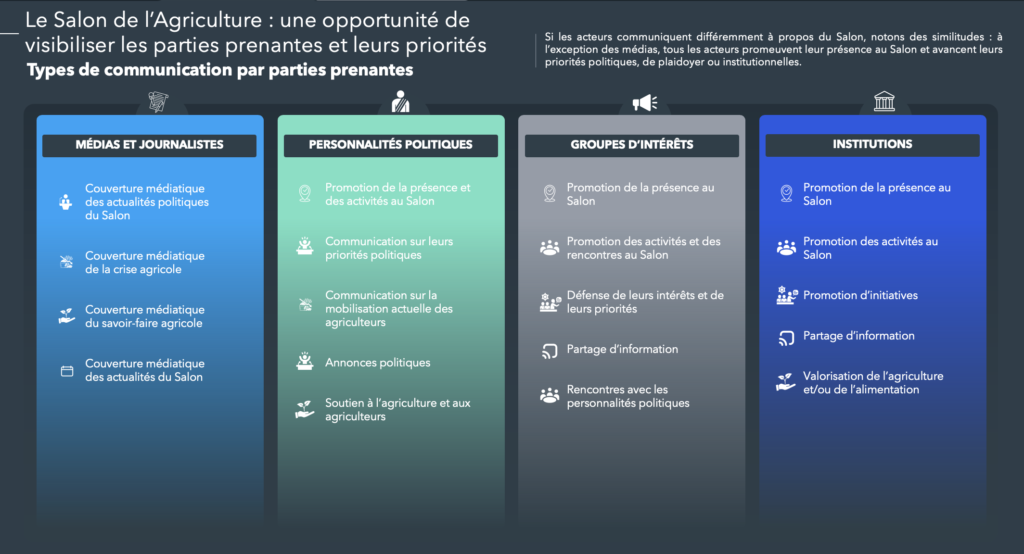
What structured this event?
It's the politics stupid
In the end, when we see the peaks via our Follaw tool, we realise that the elements were essentially political to bring the event to life on social networks:
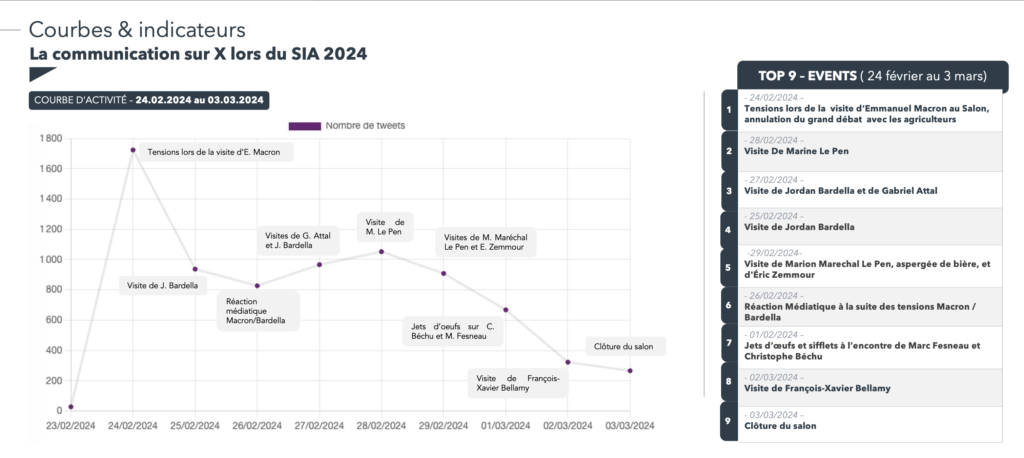
Note that the overall curve is even worse when analysed using Visibrain :
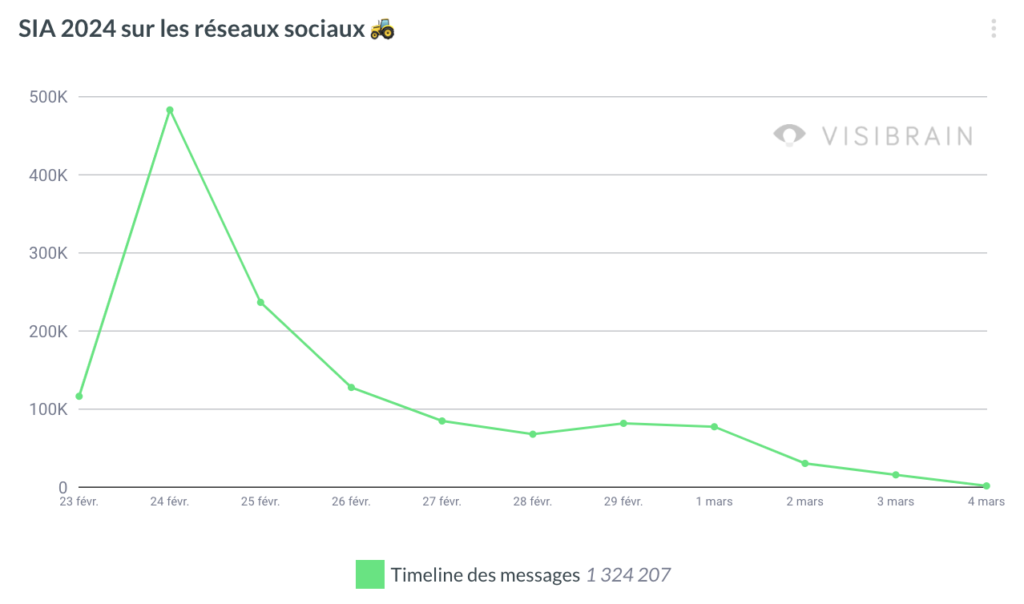
In this game, the RN was clearly the most active party on the issue: (we had already come across it strongly on this axis before.(here) Also beware of this distorting mirror, in reality, the people who are elected RN were very active, but Reconquête was particularly active on the sequence. Even more so than the RN.
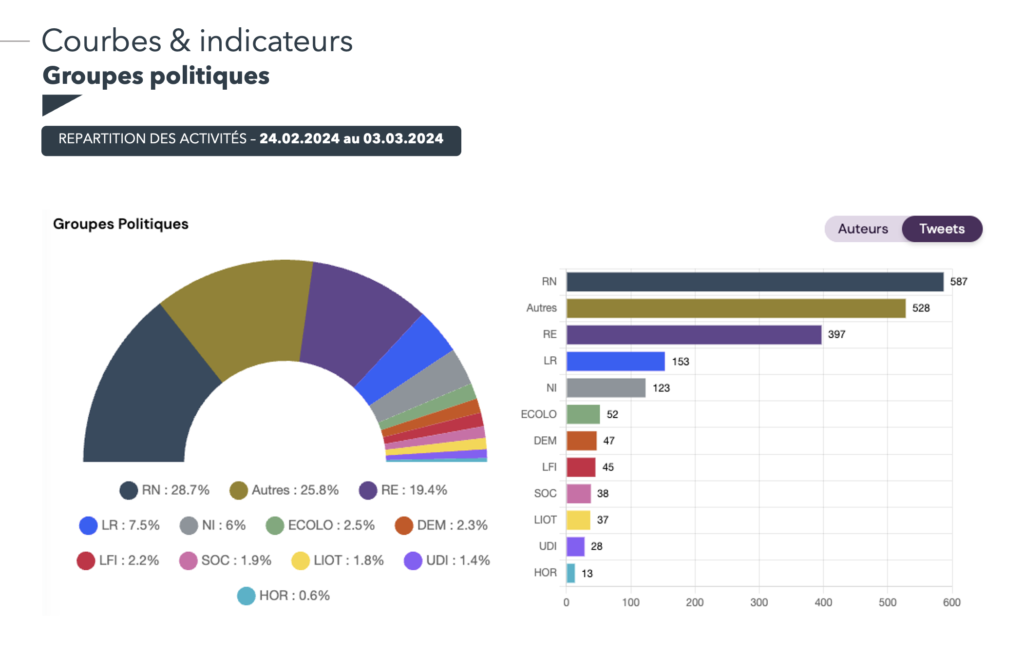
Everyone speaks for themselves
Because it's political, each of the stakeholders is talking about his own steak! No subject is correlated together. Everyone sees the event as an opportunity to put forward a few messages. And "a few" is not insignificant! 3% consistency on a subject from one stakeholder is top (foreign competition on political personalities)
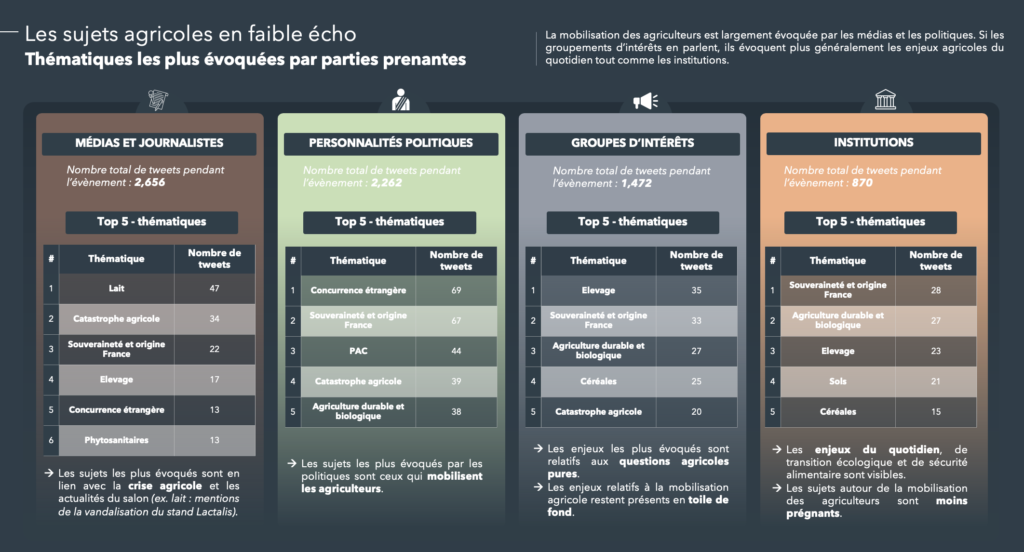
If the what is discordant and unstructured, the who is also messy with Reconquête communities (in green) that have created a dedicated and themed account around ResistPaysans, a real account with a very media-friendly logic created in January 2024 and now a curation account driven by the sovereignist far right. (No doubt Reconquête) A LFI community in blue with a few connections, as usual, that some say is interference(the Red-Brown connection) And in all this mess, a farming community in pink with very little presence makes me think: what's the point of tweeting when you can have Macron face to face?
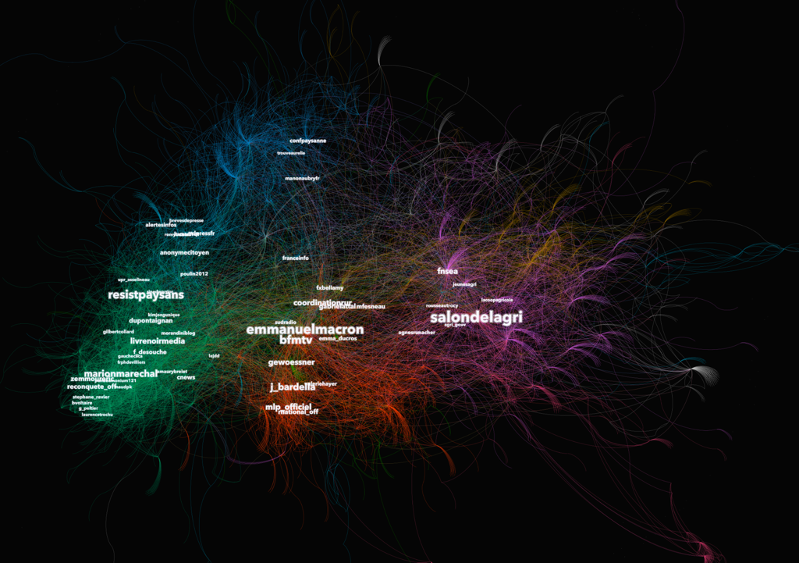
The disappearance of agriculture from social networks is even more pronounced in the relationship map, where Renaissance, RN, Reconquête, LFI and the media all dominate the networks:
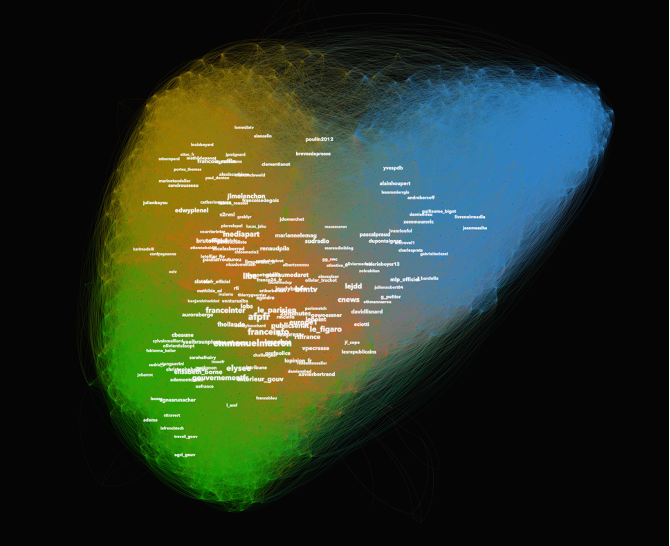
A real dialogue of the deaf ensues, with everyone thinking they have identified the problem. But in terms of the message, there's no substance, in that every tweet posted is essentially generic and doesn't address any substantive subject. The top engagement is quite revealing in this respect. (Pre-emption by extremes and absence of sub-themes beyond the global)
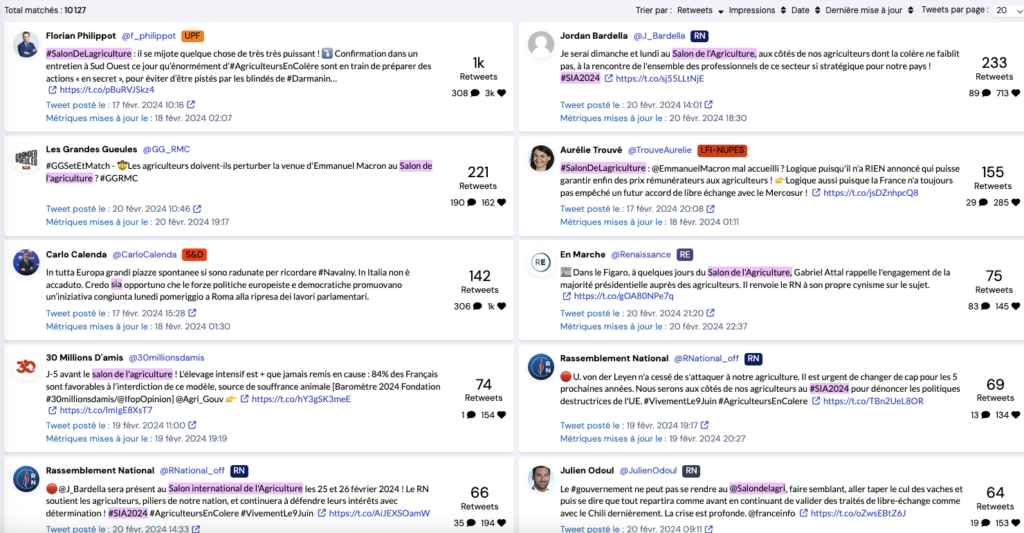
What use are social networks at these trade shows?
Essentially to draw the eye to one corner of the show rather than another. The 'offline' events at the show are never the ones you see on the curves. Should farmers mobilise on social networks when they know they'll be able to speak live to Emmanuel Macron? Real question. Does the fact that LIDL is organising an event get a lot of coverage? No. And yet that's also where things are moving. Offline and online each have their own code and their own usefulness. We need an integrated approach to optimise this. If only to ensure that we know that a player is present, where, when and what they are saying. In any case, it was particularly interesting to follow this trade show from Follaw so that we could follow the key elements in real time!
A 3-handed analysis by Manon El Assaidi, Bérenice Ditinger and Amandine Ghesquiere. Rewritten by Nicolas Vanderbiest.




